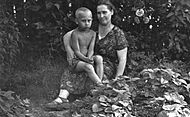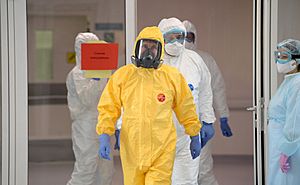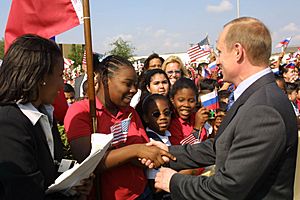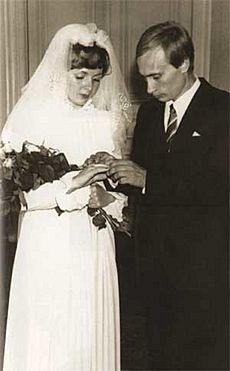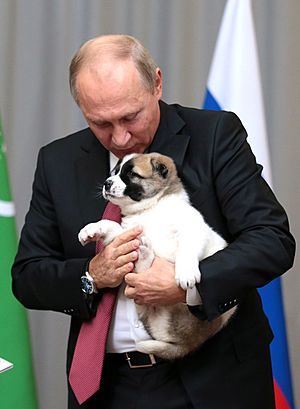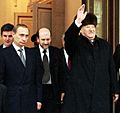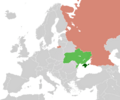Vladimir Putin facts for kids
Quick facts for kids
Vladimir Putin
|
|
|---|---|
|
Владимир Путин
|
|

Putin in 2024
|
|
| President of Russia | |
| Assumed office 7 May 2012 |
|
| Prime Minister | |
| Preceded by | Dmitry Medvedev |
| In office 7 May 2000 – 7 May 2008 Acting: 31 December 1999 – 7 May 2000 |
|
| Prime Minister | |
| Preceded by | Boris Yeltsin |
| Succeeded by | Dmitry Medvedev |
| Prime Minister of Russia | |
| In office 8 May 2008 – 7 May 2012 |
|
| President | Dmitry Medvedev |
| First Deputy |
|
| Preceded by | Viktor Zubkov |
| Succeeded by | Viktor Zubkov (acting) |
| In office 9 August 1999 – 7 May 2000 |
|
| President | Boris Yeltsin |
| First Deputy |
|
| Preceded by | Sergei Stepashin |
| Succeeded by | Mikhail Kasyanov |
| Secretary of the Security Council of Russia | |
| In office 9 March 1999 – 9 August 1999 |
|
| Chairman | Boris Yeltsin |
| Preceded by | Nikolay Bordyuzha |
| Succeeded by | Sergei Ivanov |
| Director of the Federal Security Service | |
| In office 25 July 1998 – 29 March 1999 |
|
| President | Boris Yeltsin |
| Preceded by | Nikolay Kovalyov |
| Succeeded by | Nikolai Patrushev |
| First Deputy Chief of the Presidential Administration | |
| In office 25 May 1998 – 24 July 1998 |
|
| President | Boris Yeltsin |
| Deputy Chief of the Presidential Administration – Head of the Main Supervisory Department | |
| In office 26 March 1997 – 24 May 1998 |
|
| President | Boris Yeltsin |
| Preceded by | Alexei Kudrin |
| Succeeded by | Nikolai Patrushev |
| Personal details | |
| Born | 7 October 1952 Leningrad, Soviet Union |
| Political party | Independent (1991–1995, 2001–2008, 2012–present) |
| Other political affiliations |
|
| Spouse |
Lyudmila Shkrebneva
(m. 1983; div. 2014) |
| Children | At least 2, Maria and Katerina |
| Relatives | Putin family |
| Residences | Novo-Ogaryovo, Moscow |
| Alma mater |
|
| Awards | Full list |
| Signature | |
| Military service | |
| Allegiance | Soviet Union Russia |
| Branch/service | |
| Years of service |
|
| Rank |
|
| Commands | Supreme Commander-in-Chief |
| Battles/wars |
|
Vladimir Vladimirovich Putin (born 7 October 1952) is a Russian politician who is the president of Russia. Putin has held continuous positions as president or prime minister since 1999: as prime minister from 1999 to 2000 and from 2008 to 2012, and as president from 2000 to 2008 and since 2012. He is the longest-serving Russian or Soviet leader since Joseph Stalin.
He was ranked the World's Most Powerful Individual by Forbes from 2013 to 2016.
Contents
Early life
Putin was born on 7 October 1952 in Leningrad, Soviet Union (now Saint Petersburg, Russia), the youngest of three children of Vladimir Spiridonovich Putin (1911–1999) and Maria Ivanovna Putina (née Shelomova; 1911–1998). His grandfather, Spiridon Putin, was a personal cook to Vladimir Lenin and Joseph Stalin. Putin's birth was preceded by the deaths of two brothers: Albert, born in the 1930s, died in infancy, and Viktor, born in 1940, died of diphtheria and starvation in 1942 during the Siege of Leningrad by Nazi Germany's forces in World War II.
Putin's mother was a factory worker and his father was a conscript in the Soviet Navy, serving in the submarine fleet in the early 1930s. Early in World War II, his father served in the destruction battalion of the NKVD. Later, he was transferred to the regular army and was severely wounded in 1942. Putin's maternal grandmother was killed by the German occupiers of Tver region in 1941, and his maternal uncles disappeared on the Eastern Front during World War II.
Putin attended School No. 193 at Baskov Lane, near his home. At 12, he began to practise sambo and judo. In his free time, he enjoyed reading the works of Karl Marx, Friedrich Engels, and Lenin. Putin studied German at school and speaks it fluently.
Education
Putin holds a law degree from Leningrad State University (now Saint Petersburg State University).
In 1997, he received his Ph.D. in economics from Saint Petersburg Mining University.
KGB career
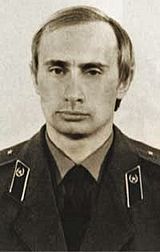
In 1975, Putin joined the KGB. From 1985 to 1990, he served in Dresden, East Germany, using a cover identity as a translator. After the collapse of the Communist East German government, Putin returned to Leningrad. He resigned from the KGB in 1991, following the coup against Mikhail Gorbachev.
Political career
In May 1990, Putin was appointed as an advisor on international affairs to the mayor of Leningrad Anatoly Sobchak. In March 1994, Putin was appointed as first deputy chairman of the Government of Saint Petersburg. In June 1996, Sobchak lost his bid for reelection, and Putin, who had led his election campaign, resigned from his position in the city administration.
On 26 March 1997, President Boris Yeltsin appointed Putin deputy chief of the Presidential Staff, a post which he retained until May 1998. On 25 July 1998, Yeltsin appointed Putin director of the Federal Security Service (FSB), the primary intelligence and security organization of the Russian Federation and the successor to the KGB.
On 9 August 1999, Putin was appointed acting Prime minister by President Boris Yeltsin. Yeltsin also announced that he wanted to see Putin as his successor.On 31 December 1999, Yeltsin unexpectedly resigned and Putin became Acting President of the Russian Federation. In the 2000 presidential elections Putin won in the first round with 53% of the vote.
Presidency
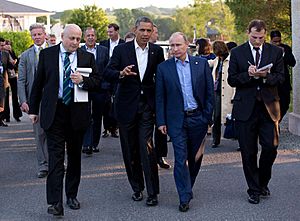
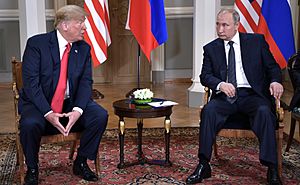
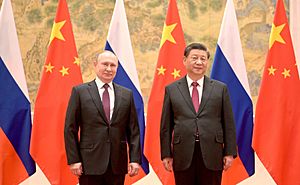
During Putin's initial presidential tenure, the Russian economy grew on average by seven percent per year, driven by economic reforms and a fivefold increase in the price of oil and gas. In 2012, Russia joined the World Trade Organization.
In 2014, Putin signed a deal to supply China with 38 billion cubic meters of natural gas per year. Power of Siberia, which Putin has called the "world's biggest construction project", was launched in 2019 and is expected to continue for 30 years at an ultimate cost to China of $400bn.
In cultural and social affairs Putin has collaborated closely with the Russian Orthodox Church. He supported the 2020 Russian constitutional referendum, which passed and defined marriage as a relationship between one man and a woman in the Constitution of Russia.
Putin is credited with ending the Second Chechen War and reestablishing federal control over the region. While serving as prime minister under Medvedev, he oversaw a military conflict with Georgia and enacted military and police reforms. In his third presidential term, Russia annexed Crimea and supported a war in eastern Ukraine through several military incursions, resulting in international sanctions.
Putin has also sought to increase Russian territorial claims in the Arctic and its military presence there. In August 2007, Russian expedition Arktika 2007, part of research related to the 2001 Russian territorial extension claim, planted the Russian flag on the seabed at the North Pole. Both Russian submarines and troops deployed in the Arctic have been increasing.
Under Putin, Russia's relationships with NATO and the U.S. have passed through several stages. After the 9/11 attacks on the U.S. in 2001, Putin had good relations with American President George W. Bush, and many western European leaders. However, the NATO-led military intervention in Libya in 2011 prompted a widespread wave of criticism from several world leaders, including Putin.
In late 2013, Russian-American relations deteriorated further when the United States canceled a summit for the first time since 1960 after Putin gave asylum to American Edward Snowden. In 2014, Russia was suspended from the G8 group as a result of its annexation of Crimea. Putin gave a speech highly critical of the United States, accusing them of destabilizing world order and trying to "reshape the world" to its own benefit. On 21 February 2023, Putin suspended Russia's participation in the New START nuclear arms reduction treaty with the United States.
In his fourth presidential term, Putin launched a military operation in Ukraine, which prompted international condemnation and led to expanded sanctions against Russia.
Putinisms
Putin has produced many aphorisms and catch-phrases known as putinisms. Many of them were first made during his annual Q&A conferences, where Putin answered questions from journalists and other people in the studio, as well as from Russians throughout the country, who either phoned in or spoke from studios and outdoor sites across Russia. Putin is known for his often tough and sharp language, often alluding to Russian jokes and folk sayings.
Personal life
Family
On 28 July 1983, Putin married Lyudmila Shkrebneva, and they lived together in East Germany from 1985 to 1990. They have two daughters, Mariya Putina, born on 28 April 1985 in Leningrad (now Saint Petersburg), and Yekaterina Putina, born on 31 August 1986 in Dresden, East Germany (now Germany).
On 6 June 2013, Putin and Lyudmila announced that their marriage was over; on 1 April 2014, the Kremlin confirmed that the divorce had been finalised.
Putin has two grandsons, born in 2012 and 2017, through Maria. He reportedly also has a granddaughter, born in 2017, through Katerina.
Pets
Putin has received five dogs from various nation leaders: Konni, Buffy, Yume, Verni and Pasha. Konni died in 2014. When Putin first became president, the family had two poodles, Tosya and Rodeo. They reportedly stayed with his ex-wife Lyudmila after their divorce.
Sports
Putin watches football and supports FC Zenit Saint Petersburg. He also displays an interest in ice hockey and bandy, and played in a star-studded hockey game on his 63rd birthday.
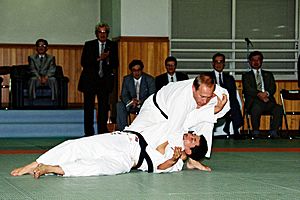
Putin has been practicing judo since he was 11 years old, before switching to sambo at the age of fourteen. He won competitions in both sports in Leningrad (now Saint Petersburg). He was awarded eighth dan of the black belt in 2012, becoming the first Russian to achieve the status. Putin also practises karate.
He co-authored a book entitled Learn Judo with Vladimir Putin in Russian (2000), and Judo: History, Theory, Practice in English (2004).
Awards and honours
See also
 In Spanish: Vladímir Putin para niños
In Spanish: Vladímir Putin para niños
Images for kids
-
Putin and wife Lyudmila in New York at a service for victims of the 11 September attacks, 16 November 2001
-
Putin, Bill Clinton, George H. W. Bush and Lyudmila Putina at the state funeral of Boris Yeltsin in Moscow, April 2007
-
Putin with Tom Brokaw before an interview on 2 June 2000
-
Putin taking the presidential oath beside Boris Yeltsin, May 2000
-
Putin as FSB director, 1998
-
Putin's Stasi "Ausweis" (identification card). He was assigned as a KGB agent in Dresden, as a mid-level liaison to the "Stasi" (East German intelligence agency) in 1985. He held a job as a translator as a "cover" for his KGB work.
-
Putin with President Boris Yeltsin on 31 December 1999, when Yeltsin announced his resignation
-
Putin with Junichiro Koizumi, Jacques Chirac, Gerhard Schröder, George W. Bush and other state leaders in Moscow during the Victory Day parade, 9 May 2005.
-
Putin with Dmitry Medvedev, March 2008
-
Putin opens the Wall of Grief, a monument to victims of Stalinist repression, October 2017
-
Putin's close associate Arkady Rotenberg is mentioned in the Panama Papers, pictured 2018
-
Putin receives Barack Obama at his residence in Novo-Ogaryovo, 2009
-
Putin in Normandy Format talks with Ukrainian president Petro Poroshenko, German chancellor Angela Merkel and French president François Hollande, 17 October 2014
-
Putin meets with U.S. president Barack Obama in New York City to discuss Syria and ISIL, 29 September 2015
-
Putin with Syrian president Bashar al-Assad in 2017
-
Putin and the newly appointed prime minister Mikhail Mishustin meeting with members of Mishustin's Cabinet, 21 January 2020
-
Putin's first deputy chief of staff Sergey Kiriyenko (left) is in charge of Russia's domestic politics.
-
Putin in a meeting with Irani president Ebrahim Raisi and supreme leader Ali Khamenei in 2022
-
Putin holds a video call with U.S. president Joe Biden on 7 December 2021
-
Pakistan's Prime Minister Imran Khan met with Putin in Moscow in 2022
-
Putin attends the Orthodox Christmas service in the village Turginovo in Kalininsky District, Tver Oblast, 7 January 2016
-
Putin with Indian prime minister Modi in New Delhi
-
Putin and Gurbanguly Berdimuhamedow, President of Turkmenistan, in October 2017
-
Putin with Italian prime minister Silvio Berlusconi and U.S. president George W. Bush at the NATO-Russia Council meeting in Rome on 28 May 2002.
-
Putin held a meeting in Sochi with German chancellor Angela Merkel to discuss Nord Stream 2 natural gas pipeline in May 2018
-
According to Putin, he and Russia have a particularly good relationship to neighboring country Finland. Picture of Putin handshaking with Sauli Niinistö, the president of Finland, in August 2019.
-
Putin and his wife Lyudmila meeting with Queen Elizabeth II, her husband Prince Philip, Duke of Edinburgh, and Prime Minister Tony Blair in 2005
-
Putin and Venezuelan President Nicolás Maduro on 22 May 2015
-
Putin and Brazilian president Jair Bolsonaro at the virtual 14th BRICS Summit on 23 June 2022. Brazil and Russia are members of BRICS.
-
Putin with Iranian president Hassan Rouhani and Turkish president Recep Tayyip Erdoğan, September 2018
-
Putin with Russia's long-serving minister of defense, Army General Sergey Shoygu, in the Eastern Military District, 2013
-
Russian GDP since the end of the Soviet Union (beyond 2014 are forecasts)
-
Putin, Lyudmila Narusova and Ksenia Sobchak at the funeral of Putin's former mentor Anatoly Sobchak, Mayor of Saint Petersburg (1991–1996)
-
In May 2000, Putin introduced seven federal districts for administrative purposes. In January 2010, the 8th North Caucasus Federal District (shown here in purple) was split from the Southern Federal District. In March 2014, the new 9th Crimean Federal District was formed after the annexation of Crimea by the Russian Federation. In July 2016, it was incorporated into the Southern Federal District.


